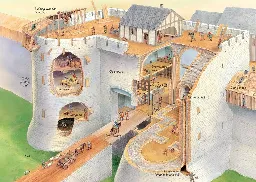Sweet how they gave them little swimming trunks.
(They were naked)
That water has to get dirty AF after a while, with the baths being used publicly.
It did, very much! There would be slaves for basic cleaning duties, but they can’t really filter the water as it’s being used. The baths were typically only drained around twice a day, so you can imagine that the more ‘public’ a bathhouse was, the worse it would be.
how cold would a plunge pool be?
They didn’t have any form of advanced cooling, so generally it would be simply unheated water kept away from the sun and away from the furnaces. You can get a room reasonably cool with stonework and clay insulation like that.
It wouldn’t look Roman, but I bet if they used ancient air conditioning techniques around a hollow tub of bronze then it could be described as properly cold
The Romans understood the capability of wind to cool structures, and would intentionally build in accordance with the prevailing winds and the needs of the structure in question, but unfortunately, I don’t believe the Romans ever developed real cooling systems of the kind that the ancient Persians did. Windcatchers and yakhchals and such.
The Romans did sometimes ferry snow from nearby mountains to cool their baths, but obviously that’s not viable in all situations - and certainly not for bathhouses frequented by ordinary citizens!
Oh yea I agree with you there. I’m imagining combining techniques like wind catchers with terracotta cooling, something that would likely only arise from our modern understanding


